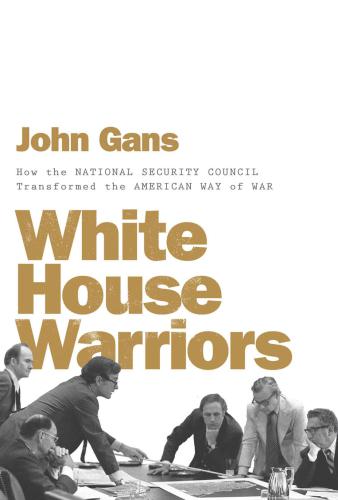
White House Warriors
How the National Security Council Transformed the American Way of War
کتاب های مرتبط
- اطلاعات
- نقد و بررسی
- دیدگاه کاربران
نقد و بررسی

February 1, 2019
A former chief speechwriter at the Pentagon expands his doctoral dissertation to demonstrate how the National Security Council has become one of the dominant forces in shaping American foreign policy.Relying on a combination of academic research and less formal anecdotes, Gans, who runs the Global Order Program at the University of Pennsylvania's Perry World House, shifts back and forth between admiration for the NSC and warnings that the mostly publicity-shy staff members have accumulated too much influence without being overseen by anybody outside the White House. The agency was originally created in 1947 to coordinate sensitive, divergent foreign policy recommendations emanating from the armed services, the Defense Department, the State Department, the CIA, and other elements, and its staffers--not subject to confirmation by the Senate or any other body independent of the president--have become a "band of warriors" for the White House. Gans identifies high-profile national security advisers to every president, beginning with Harry Truman's group of advisers and moving through Henry Kissinger, Condoleezza Rice, Henry McMaster, and others. A chief value of the book, though, is the author's focus on case studies about how less-visible staff have exerted influence. These include Alexander Vershbow and Nelson Drew, who shaped Bosnian genocide intervention during the Bill Clinton presidency. To establish his theme early, Gans opens the book with scenes suggesting the influence of NSC staff member Meghan O'Sullivan on the controversial decision of George W. Bush to invade Iraq. Perhaps the most dramatic, revealing section occurs during the Ronald Reagan presidency, as the NSC gained the influence to implement foreign policy, leading to the Iran-Contra scandal and the loss of American lives to terrorists in Lebanon. The author also offers up-to-date research about the role of the presidency of Barack Obama, and he squeezes in a few pages of impressions about the chaos of the NSC during the Trump era.A useful historical study that will especially interest those seeking a look at government from the inside.
COPYRIGHT(2019) Kirkus Reviews, ALL RIGHTS RESERVED.

April 1, 2019
Former speechwriter for the Obama administration, Gans (director of communications and research, Perry World House, Univ. of Pennsylvania) uses his insider knowledge to articulate the importance of the National Security Council (NSC) as it relates to war. The NSC was created in 1947 to help the president comprehend information vital to understanding foreign affairs. The staff have daily one-on-one interactions with the commander-in-chief and are, according to Gans, among the most important influencers when it comes to decisions about war. Gans provides the history of the NSC and its evolution into the powerful organization it is today. He covers major events in U.S. history and how different presidents chose to interact and use the NSC's expertise. Included is a highly entertaining, and at times surprising, view into the small band of people George W. Bush once called his "personal band of warriors." VERDICT Given the volatile nature of the current political climate, this bipartisan history of the NSC is a timely and worthwhile read for anyone interested in how politics and war intersect.--Jason L. Steagall, formerly with Gateway Technical Coll. Lib., Elkhorn, WI
Copyright 2019 Library Journal, LLC Used with permission.

Starred review from March 1, 2019
The following statement is in bold reference to the National Security Council (NSC), whose history Gans, a former Obama administrative speechwriter, records here in minute and solid detail: "The NSC has exerted more influence over presidential decisions than any single institution over the last seventy years, transforming not just America's way of war but also the way Washington works." This forceful historical account is a much-needed published assessment, given that NSC members are generally not known to the public, which this author believes is a good thing. In following the course of the council's evolution from its modest beginning in 1947, Gans charts its increasing power and influence on national affairs, observes significant milestones in the makeup and nature of the council, and examines the effect of the 1973 War Powers Act, "which required congressional consent for extended military deployments." All this leads to the present day, whereby the "NSC staff [are] a source of regular order in a chaotic Trump world." This book is essential reading for all interested in politics, government, and contemporary U.S. history.(Reprinted with permission of Booklist, copyright 2019, American Library Association.)

























دیدگاه کاربران